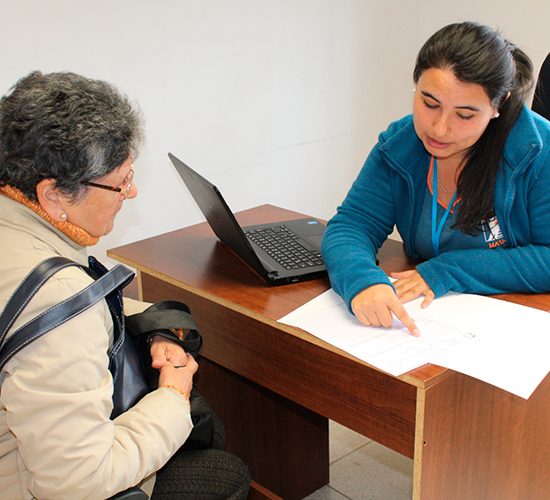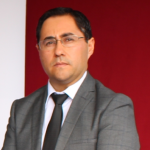Hospital Santa Rosa de Molina, will incorporate endoscopy procedure among its features for different communes in the region.

The MAUCO cohort is part of the hospital's strategic allies
With this incorporation of services, expected to be 2021-2022, 1.000 Helicobacter pilori bacteria antigen test (HP) and 1.000 assessments to detect a high-risk population of developing gastric cancer. Also, 1 is expected.000 digestive endoscopies to MAUCO study participants and 1.000 digestive endoscopies in high-risk patients and thus shorten the communal and regional waiting list between 2022 and 2024. The incorporation of this exam, will be accompanied by the formation of an endoscopy team in the region and the support of THE HP research and gastric cancer team of MAUCO, explained the director of the hospital Mr.. Nilton Palacios.

Recently the director of The Santa Rosa Hospital in Molina, Mr. Nilton Palacios reported incorporating endoscopies into its benefit portfolio "for the hospital this is a great achievement, as we are the first low-complexity of the Maule region to include this feature, helping to reduce long waiting lists and prioritize patients who need the test most," said the hospital director.
In this same line he explained that the clinical guide to gastric cancer, requests digestive endoscopy from any patient with digestive symptoms, However, currently the health system does not have enough endoscope doctors who can respond to these referrals in a timely manner, which results in undes resolution waiting lists and delay in diagnosis. "This factor is further accentuated in the resident population of Molina and other communes in the region, because they don't have endoscopy service," he added.

For 6 years, the MAUCO population study of the ACCDIS Advanced Center for Chronic Diseases, works in partnership with Molina's Santa Rosa Hospital in the Maule region by joining two key axes, research applied in the hospital and community rapprochement with science "for us, supported by the only hospital in the commune, has been essential in the development of our research. We have worked symbiotically, enhancing strengths on both sides to reach the population, knowing and contributing to her education and health promotion. The MAUCO population study, seeks to know the natural history and risk factors of various chronic diseases, making it possible thanks to molina hospital support", said dr.. Andrea Huidobro, MAUCO team member, epidemiologist and director of the Department of Preclunic Sciences at maule Catholic University.
Gastric cancer in Chile
Gastric cancer is a pathology of unequal distribution, with high incidence in Eastern Europe, Asia and South America, where Chile stands out with the highest rate of new cases per year in the region (Globocan, 2018).
According to data submitted by the Ministry of Health in 2010, gastric cancer in Chile accounted for the leading cause of death in men, with rates that have remained stable for 20 years. This pathology occurs most often between the age of 50 and 70, having a 5-year-old global survival of just 12,3%, this as a result of a late consultation.
Currently, gastric cancer is the leading cause of death in five regions of the country: Arica, Antofagasta, Coquimbo, The Lakes and Aysén and for the rest of the country is the second leading cause of death, However, it is estimated that by 2022 it will rise to the number one position.
On the other hand, Don Niltón Palacios added that "thanks to the collaboration of MAUCO, an antigen test was implemented in bowel movements that can detect whether people have the bacterium "Helicobacter pilori (HP)" – instead of diagnosing the presence of HP through more invasive methods such as endoscopies. Detecting Hp without requiring endoscopies will allow the need for endoscopy to be directed to the population at increased risk of gastric cancer, which will mean precocious diagnoses and more effective treatments. The professional also stressed that in the VII region they are pioneers in the implementation of this primary exam, where 2000 people will benefit from these services".
Right now, bypass for endoscopy is massive and does not allow the population at highest risk of gastric cancer to be selected, which involves a large number of people on the waiting list for this procedure. I.e., on some occasions unnecessary examinations are carried out for a large group of low-risk patients and on the other hand the evaluation of people who are at high risk is delayed, which explains that much of the gastric cancer diagnoses are made in advanced stages of the disease, when medicine can no longer offer a solution, explained the director of the Hospital Santa Rosa de Molina.
With this incorporation of services, expected to be 2021-2022, 1.000 Helicobacter pilori bacteria antigen test (HP) and 1.000 assessments to detect a high-risk population of developing gastric cancer. And between 2022 and 2024 1.000 digestive endoscopies to MAUCO study participants and 1.000 digestive endoscopies in high-risk patients and thus shorten the communal and regional waiting list. The incorporation of this exam, will be accompanied by the formation of an endoscopy team in the region and the support of THE HP research and gastric cancer team of MAUCO. "Thanks to the support of the Health Service and all our officials and officials, we will continue to advance on different projects to deliver better health to our users," said Don Nilton Palacios.
